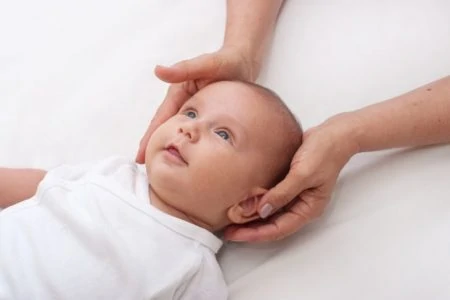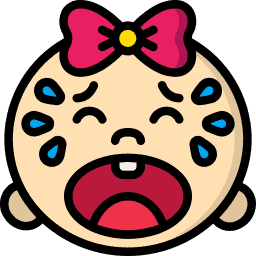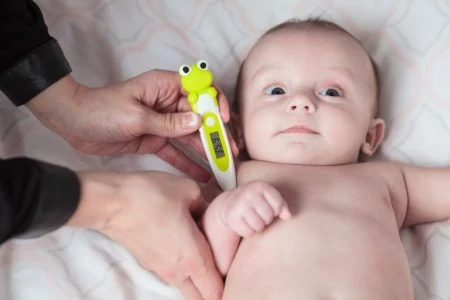Has your baby begun shaking their head? Are you worried it’s a sign of a problem?
As a mother, you expect to shake your head. You have crayon marks on the wall, sharp toys to step on, substances we won’t mention in places you never dreamed of.
However, what you don’t expect is for your baby to shake their head at you.
Understanding why your baby is shaking their head can help you identify developmental milestones as they grow and progress.
Key Takeaways
- Baby head shaking can be due to exploring, entertaining, self-soothing, or imitating adult behavior.
- Most head shaking in babies is harmless, but it could signal an ear infection or, rarely, autism if combined with other symptoms.
- Monitor your baby’s behavior and consult a pediatrician if you notice any concerning signs or symptoms.
- To stop head shaking, avoid reacting to it, monitor the timing, create a calm environment, try baby massage, and consult a doctor if needed.
Should I Worry?
Many moms wonder if they should worry if their baby is shaking their head from side to side.
The answer — probably not!
Babies grow rapidly during their first year. One important aspect is the development of gross motor skills. Gross motor skills refer to how your baby uses the larger muscles and appendages of their body to function and interact with the world around them.
Most babies can sit up, roll over, reach for objects, and explore things with their hands and mouths by the time they are 7 months old.
Although it can be scary when you see your baby start to shake their head, most of the time, they’re doing it for one of the following reasons (1).
- Exploring: Your baby may be testing how their body moves and works. Have you ever stopped to shake your head and notice how it feels? Babies react to all of these things and explore their increased range of motion.
- Entertaining: Does your baby get a happy reaction from others when they shake their head? They could be doing so in hopes of getting your attention.
- Self-soothing: Some babies shake their heads to self-soothe when they get sleepy.
- Imitating: You may not realize it, but there is a good chance you have shaken your head at your baby. They may simply be imitating your action. As they grow, they will also learn to shake their head to say “no” as adults do.
- Fatigue: Tired babies may shake their heads to create dizziness that makes falling asleep easier.
- Ear Infection: Children under the age of 3 are at the highest risk for ear infections, and your baby may be trying to communicate the problem to you.
- Nursing: The habit of shaking the head may come from your baby trying to breastfeed. Your baby’s head may move back and forth as they try to latch, and they may become excited as they nurse. They may also shake their head at the end of nursing to show they have had enough.
- Autism: A baby whose only sign is head shaking is unlikely to have autism. Babies with autism would have additional features such as having trouble making eye contact with caregivers or being unresponsive when you call their name. They may also exhibit repetitive behaviors such as banging their heads on the crib or wall.
When Shaking Signals Something Is Wrong
As a mother, it’s natural to worry about your little one and some of the new things they do as they grow up. There are a few instances when a baby may express discomfort or pain by shaking their head.
If you notice any of the following in conjunction with your baby’s abnormal movements, it may be time to visit your pediatrician.
- Symptoms of an illness or injury, such as a fever, noticeable scrapes and bruises, or a rash.
- Evidence of a fall that may have hurt your baby’s head.
- Head shaking that increases during times of stress and agitation.
- Your baby bangs their head against their crib or a wall.
- Baby has trouble making eye contact with adults.
- Other developmental delays.
- Lethargic behaviors or is having trouble waking up.
- Stiffening of limbs and muscles, unstoppable shaking or jittering movements, or trouble breathing. These are symptoms of myoclonic seizure. It is very rare, but it can be devastating or even lethal when it happens. It is important for parents to know these features and contact their doctor immediately.
The most common illness that causes a baby to shake their head is an ear infection. One of the hallmarks of an ear infection in infants who cannot verbally express their pain is a fever of 102 degrees Fahrenheit or more.
You may also notice your baby becomes upset when placed on their back, has trouble responding to sounds, or has fluid coming from their ears (2). Another frequent indication an ear infection is to blame is when you see your baby tugging on their ears.
No matter the situation, trust your maternal instincts. If your baby is shaking their head in a way that causes you concern after monitoring the situation, reach out for guidance from your pediatrician. They will be able to help you further.
Is It a Sign of Autism?
On its own, head shaking in babies is not usually a sign of autism. In most cases, autism will manifest in multiple ways for extended periods, so if you have no other concerns about your baby’s movements, it’s unlikely they have autism.
However, it’s always good to pay attention to help discover other signs early on. Autism is a disorder that can affect a child’s development in many areas, so some signs may never show up in an autistic child — they may not have every sign you commonly associate with autism.
You can begin to identify these behaviors in your baby as early as 18 months (3).
Many resources are available for parents trying to determine if their child is showing signs of autism. Most children will grow out of many of the common signs by the age of 3 if they are not autistic.
These are some signs of autism that may be present before 18 months:
- Eye contact: As babies grow, they start to make eye contact, often while nursing. Babies who cannot maintain eye contact after their eyes adjust to their world should be monitored for autism.
- Repetitive behaviors: Unusual repetitive behaviors such as banging head on objects or other maneuvers that can cause self-harm.
- Lack of interest: Even at a young age, babies can show their interest in things happening around them. If your baby seems out of it and unable to interact, mention it to your child’s doctor.
- Slower development: Your baby may have autism if they are hitting milestones consistently slower than other infants their age, especially delayed speech production or comprehension and poor social interactions.
Fortunately, unless your baby is showing any other signs listed above, there is little chance that head shaking should be any reason for alarm. Bringing it up to your child’s health care specialist can help ease your worries or confirm if anything else you’ve seen could be a sign of autism in your baby.
How to Stop Head Shaking
You may want to stop your baby from shaking their head if the action causes them potential harm or discomfort. For example, the constant shaking may make them extremely dizzy or disoriented, leading to falls and spills.
You also don’t want your baby to accidentally hit their head on anything, such as the side of the crib, a table corner, or a wall.
To stop your baby from shaking their head, follow these tips.
- Attention: Do not react when your baby shakes their head. It may be cute, but keep the cell phone down and don’t laugh. If your baby is shaking their head to get attention, any reaction will fuel them.
- Timing: Monitor the time when your baby shakes their head. If the shaking occurs during nursing or before bed, there may be underlying reasons you can address. If they do it for self-soothing purposes, learn more about other methods to help your baby sleep.
- Environment: Seek to create a calm environment for your baby if it seems they are shaking their head due to agitation and stress. Remove them to a quiet place and gently rock them. Very carefully, place your hand on the back of their head and cradle the head in an attempt to still it.
- Massage: Have you heard of baby massage? Grab some baby lotion or oil and try carefully using some of the techniques in the video below to relax your baby’s muscles. There are some specific tips on relaxing the head and neck.
- Consult your doctor: Call your pediatrician if the head shaking is severe or you notice other worrying signs such as developmental delays. Diagnosing problems early or having the reassurance that your baby is fine will help both you and your baby in the long run.
Baby Shaking Head FAQs
So… Feeling Better Yet?
The good news is it’s unlikely that anything is wrong with your baby if you haven’t spotted any additional signs, and you can fully enjoy your little one and their mannerisms.
If you do notice other concerning signs or symptoms, take your baby in for an evaluation. A doctor can confirm ear infections, autism, or other serious issues, and you’re an outstanding mom for making sure your questions get answered!








